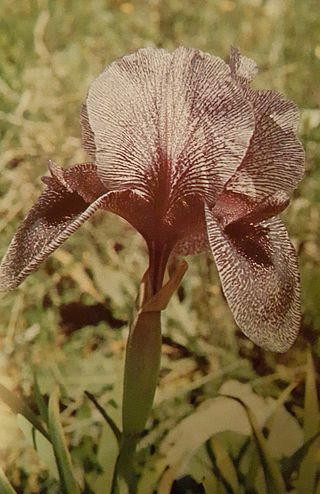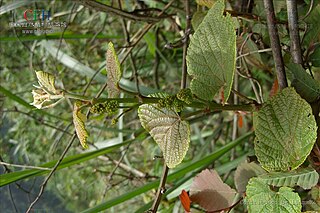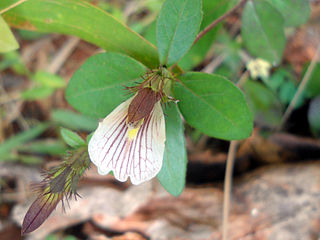
Barbera is a red Italian wine grape variety that, as of 2000, was the third most-planted red grape variety in Italy. It produces good yields and is known for deep color, full body, low tannins and high levels of acidity.

Artemisia is a large, diverse genus of plants belonging to the daisy family Asteraceae, with between 200 and 400 species. Common names for various species in the genus include mugwort, wormwood, and sagebrush.

Plantaginaceae, the plantain family, is a large, diverse family of flowering plants in the order Lamiales that includes common flowers such as snapdragon and foxglove. It is unrelated to the banana-like fruit also called "plantain." In older classifications, Plantaginaceae was the only family of the order Plantaginales, but numerous phylogenetic studies, summarized by the Angiosperm Phylogeny Group, have demonstrated that this taxon should be included within Lamiales.

Knightia is a small genus of the family Proteaceae endemic to New Zealand, named in honor of Thomas Andrew Knight. One extant species, K. excelsa (rewarewa) is found in New Zealand. Two further Knightia species are found in New Caledonia, although they were placed in the genus Eucarpha by Lawrie Johnson and Barbara Briggs in their influential 1975 monograph "On the Proteaceae: the evolution and classification of a southern family", a placement supported in a 2006 classification of the Proteaceae. A fossil species from upper Miocene deposits in Kaikorai has been described as Knightia oblonga. Knightia has been placed in the tribe Roupaleae of the subfamily Grevilleoideae.

Jeannie is an American animated television series that originally aired for a 16-episode season on CBS from September 8 to December 22, 1973. It was produced by Hanna-Barbera in association with Screen Gems, and its founders William Hanna and Joseph Barbera are the executive producers. Despite being a spin-off of sorts of the television sitcom I Dream of Jeannie, Jeannie has little in common with its parent show. In this version, the title character is rescued on the beaches of southern California by a high school student, Corey Anders. Jeannie is accompanied by genie-in-training Babu, and they become companions to Corey and his best friend, Henry Glopp, both of whom also help Jeannie and Babu adjust to their new home as well as life in Los Angeles. The series was marketed towards a younger demographic than I Dream of Jeannie.

Nyctaginaceae, the four o'clock family, is a family of around 33 genera and 290 species of flowering plants, widely distributed in tropical and subtropical regions, with a few representatives in temperate regions. The family has a distinctive fruit type called an accessory fruit or anthocarp, and many genera have extremely large pollen grains.

Galaxy Goof-Ups is a 30-minute American animated television series, a spin-off of Yogi's Space Race and the fourth incarnation of the Yogi Bear franchise. The show was produced by Hanna-Barbera Productions and broadcast on NBC from September 9, 1978, to September 1, 1979.
Germplasm Resources Information Network or GRIN is an online USDA National Genetic Resources Program software project to comprehensively manage the computer database for the holdings of all plant germplasm collected by the National Plant Germplasm System.

The Robonic Stooges is a Saturday morning animated series featuring the characters of The Three Stooges in new roles as clumsy crime-fighting cyborg superheroes. It was developed by Norman Maurer and produced by Hanna-Barbera Productions from September 10, 1977, to March 18, 1978, on CBS and contained two segments: The Robonic Stooges and Woofer & Wimper, Dog Detectives.

Trema orientale is a species of flowering tree in the hemp family, Cannabaceae. It is known by many common names, including charcoal-tree, Indian charcoal-tree, pigeon wood, Oriental trema, and in Hawaii, where it has become naturalized, gunpowder tree, or nalita. It has a near universal distribution in tropical and warm temperate parts of the Old World, with a range extending from South Africa, through the Middle East, the Indian subcontinent and southern China to Southeast Asia and Australia.

Wilibald Swibert Joseph Gottlieb von Besser, known in Russia as Vilibald Gotlibovich Besser was an Austrian-born botanist active in former eastern territories of Poland occupied by the Russian Empire, who worked most of his life within today’s territory of western Ukraine.

Stapfochloa is a genus of grasses. It is also in the subfamily Chloridoideae, and the Cynodonteae tribe.

Spergularia marina, also called Spergularia salina, is a species of flowering plant in the family Caryophyllaceae. It is known as salt sandspurry or lesser sea-spurrey. S. marina is a sprawling annual or sometimes perennial, with stems up to 35 cm (14 in) long. Like other sea-spurrey species, its flowers have white to pink petals, with sepals usually longer than the petals, at 2.5–4 mm (0.1–0.2 in). Plants are salt-tolerant, being found by the sea and in saline areas inland.

Iris susiana, commonly known as the mourning iris, is a species of perennial plant in the family Iridaceae. The mourning iris is native to the Middle East. It grows in Lebanon, Syria and Turkey, although it is believed to be extinct in the wild. It is popular as a cut flower as the flowers can easily span 12 centimeters. The survival of the species is seriously threatened by excessive picking.
Multilingual Multiscript Plant Name Database (MMPND) is a multilingual database of names of taxa of plants.

Antoni Lukianowicz Andrzejowski was a Russian-Polish botanist, zoologist and paleontologist. He also used the pseudonym Stary Detiuk, meaning "old Detiuk". The standard author abbreviation Andrz. is used to indicate this person as the author when citing a botanical name.

Vitis wilsoniae is a vining plant in the grape family native to China. It is commonly known as the net veined grape or reticulated grape. This species can be found in the provinces of Anhui, Chongqing, Fujian, Gansu, Guizhou, Henan, Hubei, Hunan, Shaanxi, Sichuan, Yunnan, and Zhejiang. The plant grows at altitudes of 400-2000m.

Blepharis maderaspatensis is a species of suffrutescent herb in the family Acanthaceae found in seasonally dry to arid habitats from Africa over Arabia to Southeast Asia.

Rogeria is a genus of plants in the Pedaliaceae family consisting of several species, with a native range extending from the island of Cape Verde to Eritrea, Namibia to the Cape Provinces.

















